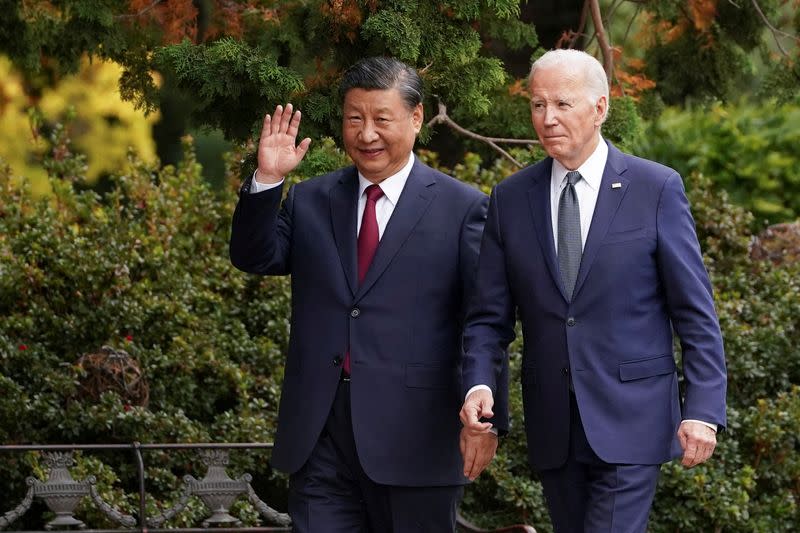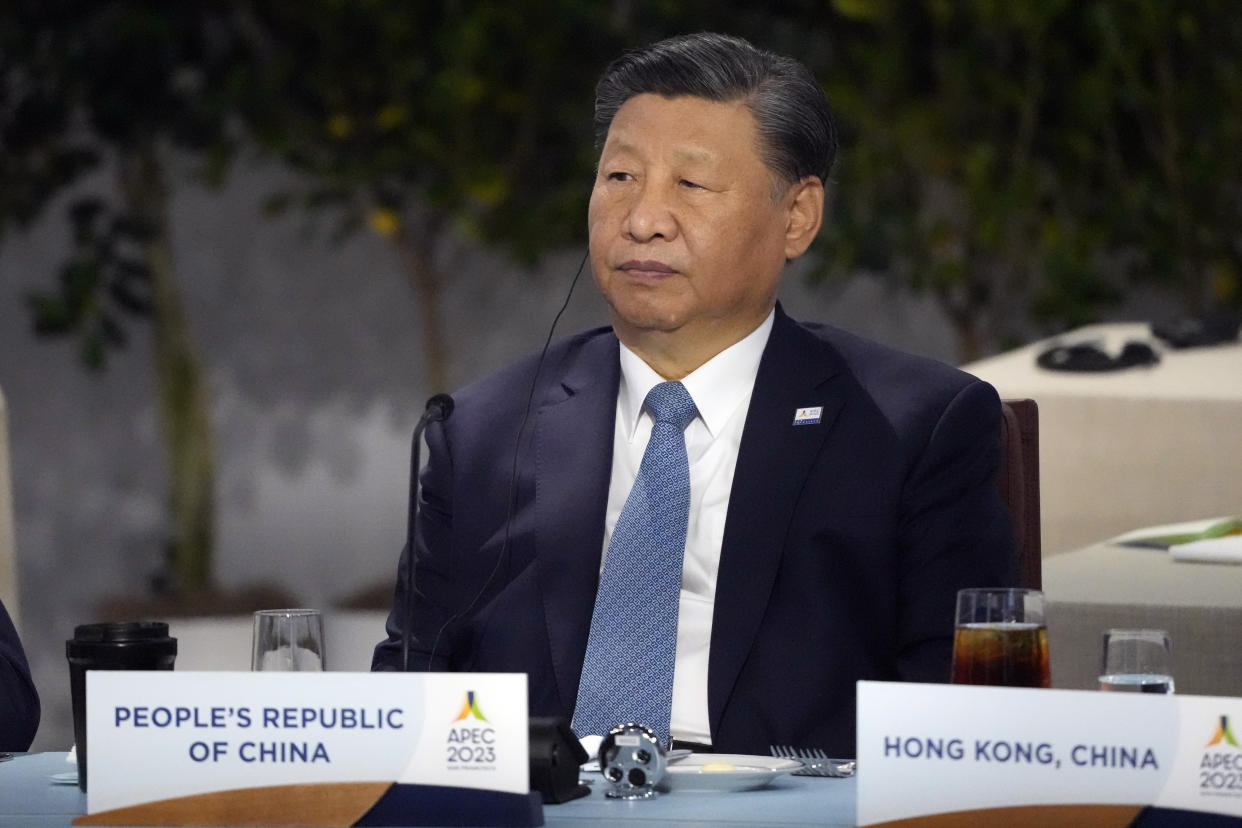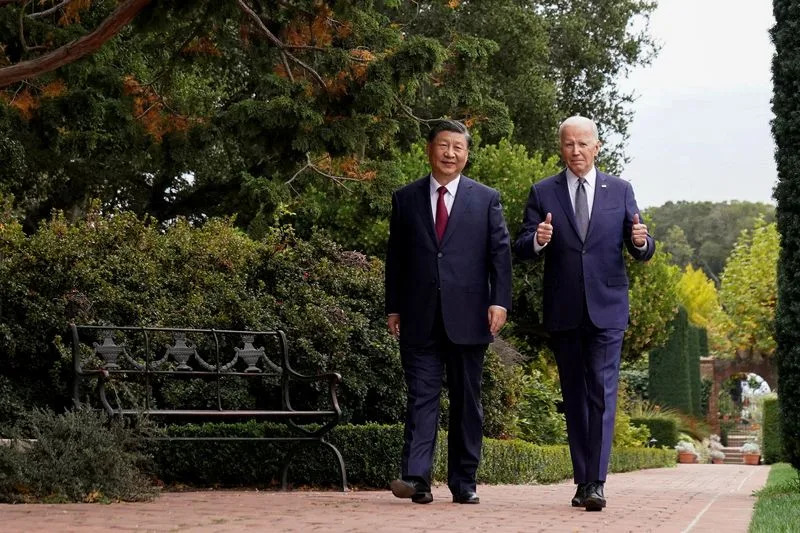MICHAEL MARTINA AND GREG TORODE
November 16, 2023

By Michael Martina and Greg Torode
SAN FRANCISCO/HONG KONG (Reuters) - When Chinese President Xi Jinping met executives for dinner on Wednesday night in San Francisco, he was greeted with not one, but three standing ovations from the U.S. business community.
It was one of several public relations wins for the Chinese leader on his first trip in six years to the United States, where he and President Joe Biden reached agreements covering fentanyl, military communications and artificial intelligence on the sidelines of the Asia-Pacific Economic Cooperation summit.
All three were outcomes the United States had sought from China rather than the other way around, said two people briefed on the trip.
But Xi appeared to have achieved his own aims: earning U.S. policy concessions in exchange for promises of cooperation, an easing of bilateral tensions that will allow more focus on economic growth, and a chance to appeal to foreign investors who increasingly shun China.
China's economy is slowing and earlier this month it reported its first quarterly deficit in foreign direct investment. And the ruling Communist Party has battled political intrigues that have raised questions about Xi's decision-making, including the sudden and unexplained removals of his foreign minister and defense minister.
"If the U.S. and China can manage their differences ... it will mean that Xi Jinping doesn't have to divert all of his attention to that (bilateral relations)," said Alexander Neill, an adjunct fellow at Hawaii's Pacific Forum think-tank.
"He needs to focus on his domestic agenda which is incredibly pressing."
DROPPING SANCTIONS FOR COOPERATION
Securing Xi's promise of Chinese cooperation on stemming the flow of fentanyl to the United States was high on Biden's to-do list for the summit. A senior U.S. official said the agreement under which China would go after specific companies that produce fentanyl precursors was made on a "trust but verify" basis.
In return, the U.S. government on Thursday removed a Chinese public security forensic institute from a Commerce Department trade sanction list, where it was placed in 2020 over alleged abuses against Uyghurs, a long-sought diplomatic aim for China.
Critics warned removing sanctions against the institute signals to Beijing that U.S. entity listings are negotiable, and have questioned the Biden administration's commitment to pressuring China over what it says is the Chinese government's genocide of Uyghurs.
"This undermines the credibility of our entity list and our moral authority," said a spokesperson for the Republican-led House of Representative's select committee on China.
On top of that, Biden's Republican opponents argue the U.S. is missing an opportunity by not leveraging China's flagging economic momentum for more diplomatic gains.
Biden also touted as a success an agreement to resume military dialogues cut by China following then-U.S. House Speaker Nancy Pelosi's 2022 trip to Chinese-claimed Taiwan.
But while Beijing would welcome lower tensions, this is unlikely to change Chinese military behavior the U.S. sees as dangerous, such as intercepts of U.S. ships and aircraft in international waters that have led to a number of near-misses.
"China fears hotlines could be used as a potential pretext for a U.S. presence in areas it claims as its own," said Craig Singleton, a China expert at the Foundation for Defense of Democracies in Washington.
Biden administration officials have acknowledged that creating functional military relations won't be as easy as semi-regular meetings between defense officials.
"This is a long, hard, slow slog and the Chinese have to see value in that mil-mil before they'll do it. That's not going to be a favor to us," one senior Biden administration told Reuters in October in the run-up to the Xi-Biden meeting.
PARTNER AND FRIEND?
In his public remarks to Biden, Xi suggested China sought peaceful coexistence with the United States, and he told business leaders China was ready to be a "partner and friend" to the U.S., words partially aimed at a business community alarmed by China's crackdown on various industries and the use of exit bans and detentions against some executives.
Similarly, Xi's televised garden walk with Biden, and the largely respectful reception given to Xi by his American hosts, was highlighted in China's tightly controlled media to show a domestic audience that their president is managing the country's most important economic and political relationship.
"Xi Jinping may have made the calculation that overhyping the American threat does China and his standing in the party and the party itself more harm than good," said Drew Thompson, a former Pentagon official who is now a scholar at the National University of Singapore.
"The fact that we are debating whether China is investible is a real problem for China."
At the same time, Xi reiterated to Biden points that he made earlier this year to Russian President Vladimir Putin, urging the U.S. president to view U.S.-China relations through "accelerating global transformations unseen in a century."
Analysts say that is code for the belief that China - and Russia - are remolding the U.S.-led international system.
Still, this time pragmatism may have outweighed ideology.
China recognizes it's still necessary for its economic progress to have somewhat normal relations with the U.S. and Western countries, said Li Mingjiang, a professor at the Rajaratnam School of International Studies in Singapore.
"It's the fundamental driving force behind the meeting."
(Reporting by Michael Martina and Greg Torode; Additional reporting by Trevor Hunnicutt in Washington, and Antoni Slodkowski and Laurie Chen in Beijing; Editing by Don Durfee and Tom Hogue)
China's Xi is courting Indo-Pacific leaders in a flurry of talks at a summit in San Francisco
DIDI TANG
November 16, 2023

SAN FRANCISCO (AP) — Chinese President Xi Jinping, fresh off his meeting with President Joe Biden, courted Indo-Pacific leaders in a flurry of meetings Thursday at a time of intensifying competition with the United States.
Xi held individual talks with the leaders of Mexico, Peru, Fiji, Japan and Brunei, all on the sidelines of a summit of Asia-Pacific Economic Cooperation economies.
In a meeting with Peruvian President Dina Boluarte, Xi said the two countries should strengthen economic and trade cooperation and pledged China’s support for Peru as host of next year’s summit of APEC leaders.
In particular, Xi said, China will be willing to import more “premium” agricultural products from the South American country and will encourage Chinese businesses to participate in major projects in Peru.
Earlier, Xi held talks with Andrés Manuel López Obrador, praising the Mexican president for his leadership and reform efforts and pledging to bring the China-Mexico relationship to a new level. It was believed to be the first face-to-face meeting between the two men.
During the meeting, the two sides agreed to deepen cooperation on counternarcotics efforts. China and the United States on Wednesday said the two would work together to stem the flow of fentanyl precursors to countries such as Mexico before the drug is finished and gets smuggled into the U.S.
Xi said the two countries should collaborate in industries such as infrastructure, finance and electric vehicles, while López Obrador said Mexico would smooth the way for Chinese businesses investing in Mexico. The Mexican leader also said his country would be willing to work with China on multilateral affairs and help promote relations between China and Latin America, according to China's state media.
In recent years, many Chinese businesses — faced with tariffs and other restrictions from the U.S. government — have moved some production to Mexico. Xi expressed his sympathy for those affected by Hurricane Otis and said China made emergency arrangements for Mexico to procure relief supplies.
The Mexican president posted on X shortly after his meeting with Xi that the two leaders “reiterated the commitment to continue maintaining good relations to the benefit of our people and our nations.”
Xi met Fiji's Prime Minister Sitiveni Rabuka. Xi said Beijing is treating Fiji as “a good friend and a good partner” in the Global South, roughly referring to developing countries.
The Chinese leader also met with Japanese Prime Minister Fumio Kishida and the sultan of Brunei.
In an opening statement, Kishida said China and Japan "share a mutual responsibility to contribute to the peace and prosperity of the world.”
China said Xi told Kishida that it is in the interest of the two peoples for the two countries to coexist peacefully, cooperate and grow together. Xi said the two sides should handle differences properly and focus on common interests.
Xi called Hassanal Bolkiah, Brunei’s sultan, an “old friend” and said China would work with Brunei to bring benefits to both people.
Xi spent four hours with Biden on Wednesday, their first face-to-face meeting in a year.
Hear from the Iowa woman who's been friends with Xi Jinping for 25 years
Biden removes sanctions from Chinese institute in push for fentanyl help
Thu, November 16, 2023

By Alexandra Alper and Michael Martina
WASHINGTON (Reuters) -The Biden administration on Thursday removed the Chinese Ministry of Public Security's Institute of Forensic Science from a trade sanction list, part of a bid to convince Beijing to do more to halt the flow of the synthetic opioid fentanyl into the United States.
Washington put the institute on the list in 2020 over alleged abuses against Uyghurs and other minority groups, effectively barring it from receiving most goods from U.S. suppliers.
Former Chinese ambassador to the U.S. Qin Gang last year described it as "shocking" that the U.S., which had expressed frustration over Beijing's lack of cooperation on fentanyl, would sanction an institute he described as essential to controlling the drug.
The Chinese embassy in Washington did not immediately respond to a request for comment.
Reuters had previously reported the institute would be removed as Biden sought more cooperation from Beijing on fentanyl in a meeting with China's President Xi Jinping on Wednesday in San Francisco at the Asia-Pacific Economic Cooperation (APEC) forum.
As part of the meeting, the men agreed to create a working group on counter-narcotics cooperation. The White House's National Security Council did not respond to a request for comment on what, beyond creating the working group, China pledged to do to stem shipments of the deadly narcotic.
The move was criticized by human rights activists and Republicans, who accused the Biden administration of going soft on Beijing over its treatment of Uyghurs.
Rayhan Asat, a human rights lawyer of Uyghur heritage, said she recognized the pressing issue posed by fentanyl, but that the U.S. decision raised questions about U.S. commitment to addressing China's rights abuses.
"The United States has a legal obligation, under federal law, to address atrocity crimes once they have been determined as such. The question then arises: should addressing one issue take precedence over addressing the genocide? Can't we address both?" she said.
Blocking fentanyl "precursor" chemicals has been a priority for Washington as the rate of overdose deaths involving the drug more than tripled from 2016 through 2021, according to the U.S. Centers for Disease Control and Prevention (CDC).
The removal, according to a notice posted in the Federal Register, came after a "removal proposal" was received and reviewed, the department said in the posting, by a committee composed of representatives of the departments of Commerce, State, Defense, Energy, and sometimes, the Treasury.
(Reporting by Alexandra Alper, Michael Martina and Paul Grant; Editing by Doina Chiacu, Chizu Nomiyama and Josie Kao)
Biden removes sanctions from Chinese institute in push for fentanyl help
Thu, November 16, 2023

By Alexandra Alper and Michael Martina
WASHINGTON (Reuters) -The Biden administration on Thursday removed the Chinese Ministry of Public Security's Institute of Forensic Science from a trade sanction list, part of a bid to convince Beijing to do more to halt the flow of the synthetic opioid fentanyl into the United States.
Washington put the institute on the list in 2020 over alleged abuses against Uyghurs and other minority groups, effectively barring it from receiving most goods from U.S. suppliers.
Former Chinese ambassador to the U.S. Qin Gang last year described it as "shocking" that the U.S., which had expressed frustration over Beijing's lack of cooperation on fentanyl, would sanction an institute he described as essential to controlling the drug.
The Chinese embassy in Washington did not immediately respond to a request for comment.
Reuters had previously reported the institute would be removed as Biden sought more cooperation from Beijing on fentanyl in a meeting with China's President Xi Jinping on Wednesday in San Francisco at the Asia-Pacific Economic Cooperation (APEC) forum.
As part of the meeting, the men agreed to create a working group on counter-narcotics cooperation. The White House's National Security Council did not respond to a request for comment on what, beyond creating the working group, China pledged to do to stem shipments of the deadly narcotic.
The move was criticized by human rights activists and Republicans, who accused the Biden administration of going soft on Beijing over its treatment of Uyghurs.
Rayhan Asat, a human rights lawyer of Uyghur heritage, said she recognized the pressing issue posed by fentanyl, but that the U.S. decision raised questions about U.S. commitment to addressing China's rights abuses.
"The United States has a legal obligation, under federal law, to address atrocity crimes once they have been determined as such. The question then arises: should addressing one issue take precedence over addressing the genocide? Can't we address both?" she said.
Blocking fentanyl "precursor" chemicals has been a priority for Washington as the rate of overdose deaths involving the drug more than tripled from 2016 through 2021, according to the U.S. Centers for Disease Control and Prevention (CDC).
The removal, according to a notice posted in the Federal Register, came after a "removal proposal" was received and reviewed, the department said in the posting, by a committee composed of representatives of the departments of Commerce, State, Defense, Energy, and sometimes, the Treasury.
(Reporting by Alexandra Alper, Michael Martina and Paul Grant; Editing by Doina Chiacu, Chizu Nomiyama and Josie Kao)
A TYRANT MAYBE
Watch: Blinken winces as Biden brands Xi a ‘dictator’
Rozina Sabur
Thu, November 16, 2023
Antony Blinken appeared uneasy as Joe Biden described Xi Jinping as a “dictator” and briefed the press that a deal to free Israeli hostages could be imminent.
During a press conference following his meeting with the Chinese leader in California, Mr Biden apologised to his secretary of state for revealing too much on the state of Hamas-Israel hostage negotiations.
The US President said: “I don’t want to get ahead of myself here... but we have gotten great cooperation from the Qataris”, a key intermediary between Israel and Hamas.
‘I know Mr Secretary, I’m going to stop’
Mr Biden remarked about a “pause the Israelis have agreed to” as he described progress toward a deal, before cutting himself off as the US secretary of state sat stony-faced.
The president went on to say: “I’m giving too much detail. I know Mr Secretary, I’m going to stop. But I am mildly hopeful.”
Mr Biden made the comments during a solo press conference in northern California following a four-hour summit with Chinese president Xi Jinping.
At the end of the news conference, he was asked whether he still held the view that Mr Xi was a dictator, something he said in June.
“Look, he is. He’s a dictator in the sense that he’s a guy who runs a country that is a communist country that’s based on a form of government totally different than ours,” Mr Biden responded.
Mr Blinken appeared to wince and wring his hands when the US President made the remark.
No comments:
Post a Comment